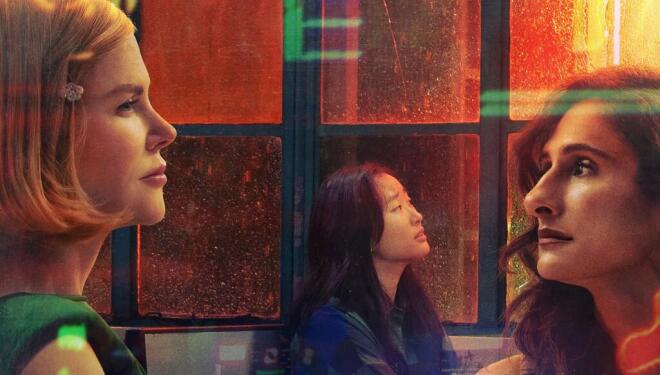Patrick Melrose star Prasanna Puwanarajah talks to Culture Whisper
Patrick Melrose actor Prasanna Puwanarajah talks drug abuse, class and working with Benedict Cumberbatch

What he doesn’t tell you – but what instantly becomes clear – is that behind all of Patrick’s whizz-bang energy, zig-zagging him between his droopy-eyed highs and suicidal lows, is a fountain of money that keeps him in the smack. And coke. And quaaludes. Pills too big to swallow, needles that can be wrapped in a handkerchief and slipped into the top pocket of a dinner jacket, and white powders spilled over the finest coffee tables that New York's hotels have to offer.
Patrick Melrose feels in some ways like watching an updated Evelyn Waugh, what with all these debauched, damaged, upper-class boys burning wildly through money. But is it glamorous though? ‘I think that’s where these stories are really fascinating, this is about the necessity of drugs rather than the glamour of drugs,’ Prasanna says.
Well, he ought to know. Charming, funny and embarrassingly accomplished, Prasanna has had a gobsmacking career that has taken him to The National Theatre (he’s currently starring in Absolute Hell on stage) and the BBC’s award-winning Doctor Foster, all the way – can you believe – from the floors of the NHS's many hospitals, where he was once a doctor.
For all his accomplishments, Patrick Melrose looks set to be Prasanna's most interesting role yet. In the series, adapted from five semi-autobiographical novels by Edward St Aubyn, Prasanna plays Patrick’s best friend and fellow drug-user Johnny Hall, a man who has known Patrick ‘since teenagers’ and who – like Patrick – is battling a drug problem.
‘They are engaged in the same sort of behaviour. They have a slightly superior supercilious quality to them as they observe the world, and as over time they both realise that their drug use is still a place to escape into, and that they have to face up to the things in their world that they’re both running from,' Prasanna explains. 'They have a shared journey. Their relationship is incredibly honest and of parity. There’s a lot of love there.'

Prasanna Puwanarajah in Patrick Melrose
You might think that Prasanna's medical history would come in handy for a role like this, but you'd be wrong. 'We took loads of drugs as junior doctors,' Prasanna jokes – quickly adding that actually, no, his medical history has been completely 'un-useful in that area'.
'I had a sense of the physiology of what these drugs do. But getting into conversations about subjective experience actually doesn’t really happen when training as a doctor... The truth is probably not. I’ve met a number of patients over the years who have been in various places in the journey of drug use, but your considerations when you’re looking after a patient in a medical sense are very different, actually.'

Patrick Melrose on Sky Atlantic
Being true to the experience of people in the midst of a battle against drugs has clearly been of the utmost importance to Prasanna, and he tells me he doesn't now like to use the phrase 'drug addiction'.
'The thing about the word 'addiction' is that the people who I spoke to – in the process of researching this project – found it a label that was unhelpful and stereotyping. And I’m very respectful of when you go into someone else’s space, you come into their emotional landscape, and you have to emerge changed by it.
'The naming of things becomes really important to me. It’s a small way of trying to measure out someone else’s experience… beginning with the language they might use, it’s a tiny step along the way.
'I’m very interested in drama that isn’t sensational,' he says. 'But that is made of minutely observed human interactions that evolve over time, like a little crystal growing. That feel real in human life. For me this [project] is interesting because it shines a light onto those aspects of recovery that aren’t about as you say ‘the dark glamour’ of drug use.
That sense of glamour I've put my finger on, he tells me, only comes from the drugs being a part of something that is 'hidden, subversive and illicit.'
'It's just a thing that happens in secretive orbits, and so becomes something that audiences get curious about. But in this case [in the series], it wasn't that. This is a lot more real, a lot more human, and therefore opens up the conversation to a realer place about how people live a life in recovery.'

Prasanna in Critical on Sky 1
A lot of the 'realness' of both the series and the books can be attributed to the author Edward St Aubyn, who based these books partly on his own real life experience.
'The books have such a striking quality because they are semi-autoboigraphical so you can feel the them heat coming off them, the necessity of the writing, it makes for such a striking experience. They feel right on the nose.'
The whole thing, Prasanna reminds me, 'is set in a slice of the British class struggle that is really specific to Edward St Aubyn. What he’s saying is that the experience of being in the grip of the need, is something that actually is shared by people from all across the intersectional slices of life.
'Any analysis of dependency reveals groups of people who come together who actually have very little else in common. It’s the bit of the show that really interested me. I don’t know if there is a universality to this story – his circumstances are so specific but it certainly isn’t a show that glamourises drug use, if anything it’s a show about the difficulty of recovery and how much of a profound challenge that journey of redemption is.'
Patrick Melrose comes to Sky Atlantic on Sunday 13 May, 9pm.





